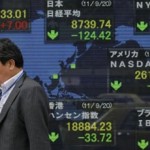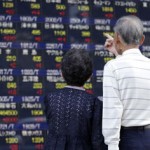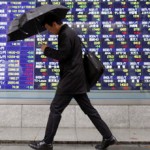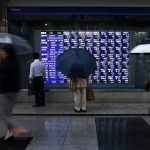Asian Stocks Slip With Won on Portugal as Gold Holds Gain
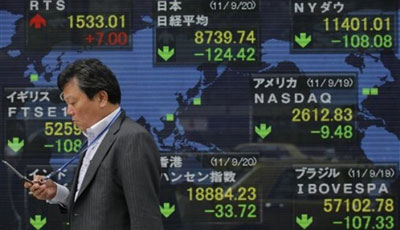
Asia’s benchmark stock index headed for its first weekly loss since May 9, the cost of insuring bonds in the region climbed and the yen maintained gains with gold amid concern that Europe’s debt problems haven’t been resolved. South Korea’s won fell a sixth day.
The MSCI Asia Pacific Index lost 0.4 percent by 2:07 p.m. in Tokyo, poised to snap the longest streak of weekly gains since March 2012. Standard & Poor’s 500 Index futures were little changed. Asian credit-default swap prices headed for the biggest weekly jump in four months. The Australian dollar weakened 0.1 percent versus the dollar as the country’s three-year bond yield touched the central bank’s cash rate for the first time since August. The won slid 0.6 percent, the yen traded near a seven-week high and gold was close to its priciest since March.
More than $1 trillion has been wiped from the value of global stocks since a peak on July 9 amid concern that the Federal Reserve may increase rates sooner than previously thought and as European bonds tumbled after a parent of Portugal’s No. 2 lender missed a debt payment. Investors are awaiting testimony from Fed Chair Janet Yellen next week after minutes from the bank’s June meeting showed policy makers are concerned that markets may be complacent about risk.
“The very benign attitude to risk that we’ve seen in markets recently was an accident waiting to happen,” Chris Green, director of economics and strategy in Auckland at First NZ Capital Ltd., said by phone. The Portugal situation “is not a sufficient enough of a catalyst to provoke a significant reassessment but it is a shot across the bow. It highlights the risks inherent in the euro zone’s vulnerabilities.”
Fast Retailing
Japan’s Topix lost 0.4 percent, set for the lowest close since June 27 and a weekly retreat of 2.4 percent, the most since April. The Nikkei 225 Stock Average declined 0.5 percent, also falling a fifth day. Fast Retailing Co., a Japanese clothing retailer with the biggest weighting on the Nikkei 225, lost 2.5 percent after cutting its annual profit forecast for a second time in the current fiscal year.
Hong Kong’s Hang Seng Index dropped 0.4 percent, with a gauge of Chinese shares in the city sliding 0.3 percent. Australia’s S&P/ASX 200 Index (AS51) climbed 0.4 percent, while the Kospi gauge in Seoul fell 0.8 percent. Australian home lending was flat in May from a month before, defying economists’ estimates for a 0.5 percent decline.
India reports trade figures today. Infosys Ltd. rallied 1.6 percent after posting first-quarter profit that beat analyst estimates as India’s second-largest software services company pared costs and won more orders. The S&P BSE Sensex Index climbed 0.2 percent, its first advance in four days.
Yen Strength
The MSCI All-Country World Index is heading for a weekly drop of 1.5 percent, the steepest since the five days to April 11. MSCI’s Asia-Pacific measure, which reached a six-year high July 7, traded at 13.3 times estimated earnings for member companies, down from 13.5 times earlier in the week, the most expensive level since December.
The yen, regarded as a haven by some investors,climbed 0.1 percent to 101.24 per dollar today after gaining 0.3 percent last session. Japan’s currency touched 101.07 yesterday, its strongest intraday level since May 21, and is headed for a 0.7 percent weekly gain, the most since April.
Gold has gained more than 0.6 percent over each of the past two days and traded at $1,337.36. The precious metal is headed for a sixth straight weekly advance, rising 1.3 percent, the longest run of gains since March.
The Korean won slipped a sixth consecutive trading day, sliding to 1,020.29 per dollar, which would be the lowest close since June 25.
Aussie, U.S.
Australia’s dollar traded at 93.86 U.S. cents and the yield on three-year government securities fell as much as four basis points to 2.499 percent, just below the Reserve Bank of Australia’s 2.5 percent benchmark cash rate.
The S&P 500 dropped 0.4 percent to 1,964.68 yesterday after sinking as much as 1 percent in the earlier part of the New York day. The benchmark gauge is down 1.1 percent this week, set for its steepest weekly retreat since April. The Russell 2000 Index of smaller companies ended the U.S. day down 1 percent, paring a decline of as much as 1.9 percent. The value of global equities climbed to a record $66 trillion last week, data compiled by Bloomberg show.
“People will shoot first and ask questions later when news like this hits,” said Lawrence Creatura, a fund manager at Federated Investors Inc. in Rochester, New York. His firm manages about $363.8 billion. “The concern of an event like this is always determining whether it’s occurring in isolation or whether it’s the first domino. It’s a classic flight to safety across the equity, commodities and bond markets.”
Shares Suspended
Shares of Banco Espirito Santo SA were suspended yesterday after sliding more than 17 percent, while its bonds sank to record lows even as Portugal’s central bank said it can avoid contagion risks. Espirito Santo International missed payments on commercial paper to “a few clients,” according to a July 8 statement. The company is the biggest shareholder of Espirito Santo Financial Group, which owns 25 percent of the bank. Trading in ESFG shares and debt was also halted yesterday.
Portuguese bonds retreated for a fourth day, with yields on 10-year notes up 21 basis points, or 0.21 percentage point, to 3.97 percent yesterday. Ten-year Italian yields rose six basis points to 2.94 percent and Spanish bonds due in a decade yielded 2.82 percent, up seven basis points. The Stoxx Europe 600 Index tumbled 1.1 percent to the lowest level since May. The gauge is headed for a weekly drop of 3.3 percent, in what would be its biggest decline in more than a year.
Source: bloomberg









